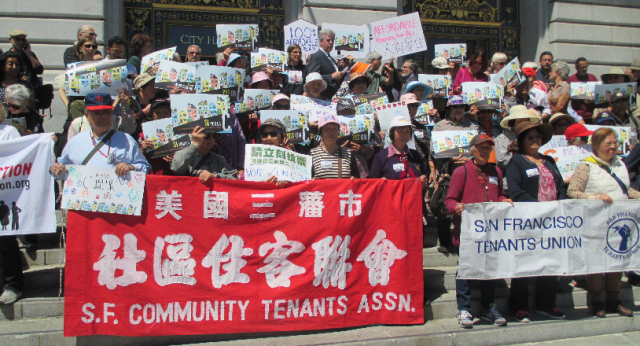
Less than a week after hearing oral arguments on the validity of the city’s big-business tax to fund homeless programs, a unanimous panel of the state Court of Appeal released an opinion confirming that Prop. C is valid.
This is a profoundly important decision.

The Court ruled, in essence, that the power of the people to place initiatives on the ballot trumps the restrictions in Prop. 13 that make it hard to pass new local taxes.
In California, “[a]ll political power is inherent in the people,” who retain “the right to alter or reform” government by voter initiative “when the public good may require,” the Court concluded.
The anti-tax groups that tried to block the law can and almost certainly will appeal to the state Supreme Court, but since the high court has already ruled on key elements of the case, it’s unlikely the justices will even take the case.
That means that the city could have access to some $300 million a year for housing and homeless programs relatively soon. (The city is already collecting the tax but can’t spend it until the City Controller certifies that the legal mandates have been met.)
At a time when cities and counties are seeing their budgets devastated by the COVID outbreak, the ruling could set a huge precedent: It the decision holds up, community coalitions could place measures on the ballot all over California to raise taxes on big business to fund critical human needs.
It’s a huge win for San Francisco City Attorney Dennis Herrera, whose office was the first in the state to arguethat a Supreme Court decision on a cannabis fee in the City of Upland could make it possible for San Francisco to raise taxes with a simple majority vote.
Prop. 13, and it’s successor Prop. 218, mandate a two-thirds vote of the people for any special tax – that is, any tax that goes to a specified purpose (like housing for homeless people).
But after the Upland case, Herrera told me today, a team of deputy city attorneys led by the late, great Buck Delventhal decided that San Franciscans could put an initiative on the ballot to raise taxes – and since that initiative would be the work of the people, and not of local government officials, the two-thirds rule wouldn’t apply.
That was the legal basis for Proposition C, which raises taxes on the biggest corporations in the city.
Mayor London Breed opposed Prop. C. So did state Senator Scott Wiener and Assemblymember David Chiu. That, with the money from tech companies that didn’t want to pay the tax, was almost certainly the reason is didn’t get two-thirds of the vote.
But if there’s a positive side to that, it’s the decision by the Appeals Court will now apply statewide. Hererra told me he agreed this was one of the most important tax rulings since the passage of Prop. 13 in 1978.
“We brought this case to uphold the will of the voters, and we’re pleased the First District Court of Appeal has agreed with us in a unanimous decision,” Herrera said in a press statement. “We were the first public law office to announce, following the City of Upland decision, that when voters act through the initiative process, a simple majority is required. This issue has been before the court in San Francisco in three recent cases. In all three the court has upheld the will of the voters and said a simple majority is required. And now the Court of Appeal has agreed.”
And now the devastating anti-tax wall that was built by Prop. 13 and prop. 218 is starting to crumble – just in time.


